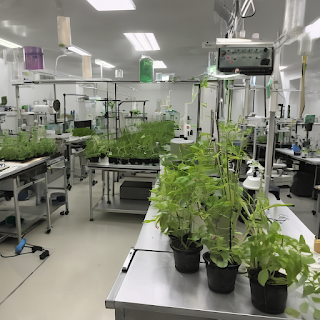As a young farmer passionate about sustainable agriculture and new frontiers in biotechnology, I'm always keeping an eye out for promising innovations that could help smallholders like myself build climate resilience. One area generating huge interest is precision genome editing, which offers a non-GMO path to developing stress-tolerant varieties through targeted DNA changes.
In this article, I'll share my perspectives on genome editing's potential role in integrated disease management after attending several conferences on the topic. While acknowledging valid safety concerns, I believe this technology could revolutionize global food security if developed and applied responsibly with farmer priorities in mind. My hope is that open discourse helps guide genome editing towards benefiting small-scale agriculture worldwide.
The Promise of Precision Breeding
Traditional plant breeding is limited by the genetic diversity available within cross-compatible species. Genome editing bypasses these constraints by directly and precisely modifying DNA sequences. Techniques like CRISPR-Cas9 allow introducing traits from distant relatives or entirely new combinations not present in current germplasm.
This opens up exciting possibilities for developing varieties naturally resistant to major pathogens through targeted changes conferring disease tolerance. For example, editing rice to express resistance genes from wild relatives could curb devastating fungal pandemics with minimal pesticide use.
Similarly, editing tomato to overexpress its own defense signaling pathways may provide broad-spectrum protection against a range of soilborne diseases currently controlled through fumigation. Such precisely bred varieties could help smallholders adapt to climate stresses with minimal external inputs.
Potential Benefits for Smallholder Agriculture
For resource-poor farmers in the developing world, genome editing holds promise as a sustainable intensification tool. Disease-resilient varieties bred through precision techniques may reduce yield losses, lower production costs and stabilize incomes in the face of threats exacerbated by climate change.
This is especially relevant for smallholders cultivating traditional, locally adapted landraces that currently lack genetic resistance to emerging pathogens. Genome editing could fortify these valuable varieties already suited to diverse agro-ecologies and cultural preferences versus commercial hybrids.
Open-source breeding platforms may also accelerate variety development and dissemination. Regional networks of smallholder cooperatives, plant breeders and researchers could collaborate utilizing shared genome editing toolkits, databases and field testing infrastructure. This decentralized, participatory model could revolutionize public breeding for marginalized farmers.
Addressing Valid Safety Concerns
Of course, genome editing also raises valid health, environmental and socio-economic concerns that must be addressed proactively through open dialogue. On the safety front, precise techniques like CRISPR minimize off-target mutations versus transgenic approaches. Still, rigorous testing is needed to ensure no unintended effects occur.
Regulatory frameworks must be proportionate, balancing innovation with precaution based on solid science rather than perception alone. Overly restrictive policies risk stifling progress towards sustainability goals. At the same time, public trust depends on transparency around research oversight, risk assessment and benefit-sharing.
Intellectual property issues also need resolution to ensure smallholders access improved varieties on reasonable terms versus corporate control. Open-source, non-commercial platforms may help guarantee genome editing serves farmers rather than undermining their livelihoods or food sovereignty.
With open yet rigorous processes respecting multiple perspectives, I believe genome editing's potential as a sustainable tool can be realized while addressing all reasonable concerns. An inclusive, solutions-focused discourse is key to building understanding and guiding research responsibly.
A Holistic Approach is Needed
Of course, precision breeding alone will not solve agriculture's complex, interconnected challenges under climate change. Genome editing must be viewed as one part of an integrated strategy combining agroecological practices, policy support, market access and social development.
Variety improvement through any method serves little purpose without accompanying investments in smallholder capacity, infrastructure, risk mitigation, post-harvest management and fair trade. A holistic approach addressing root causes of vulnerability empowers farmers as decision-makers and stewards of genetic resources.
Similarly, breeding goals must reflect diverse agro-ecologies and cultural needs versus singular productivity targets. Participatory variety selection ensures locally adapted, nutrient-dense crops best suited to diverse contexts and diets. Genome editing thus complements agroecology when guided by farmers as equal partners from project design through dissemination.
The Road Ahead
Excitingly, several initiatives are already piloting this holistic, farmer-focused model of participatory genome editing for sustainable intensification. Projects in Asia, Africa and Latin America collaborate directly with smallholder communities, public breeders and local universities developing stress-tolerant varieties of major food crops through open platforms.
Looking ahead, I'm hopeful continued open-minded yet evidence-based discourse helps maximize this technology's potential benefits while addressing all reasonable concerns. With care, precision and responsibility, genome editing could empower millions of vulnerable farmers globally as effective stewards and decision-makers.
In closing,
an inclusive process respecting diverse perspectives from scientists to citizens is key to building understanding and guiding research responsibly. Sustainability depends on nurturing both people and planet - a goal I believe new tools like genome editing can support, but only through cooperative efforts recognizing our shared stake in a just food system. The journey ahead is an exciting one if we walk it together in trust and care for one another.

Post a Comment